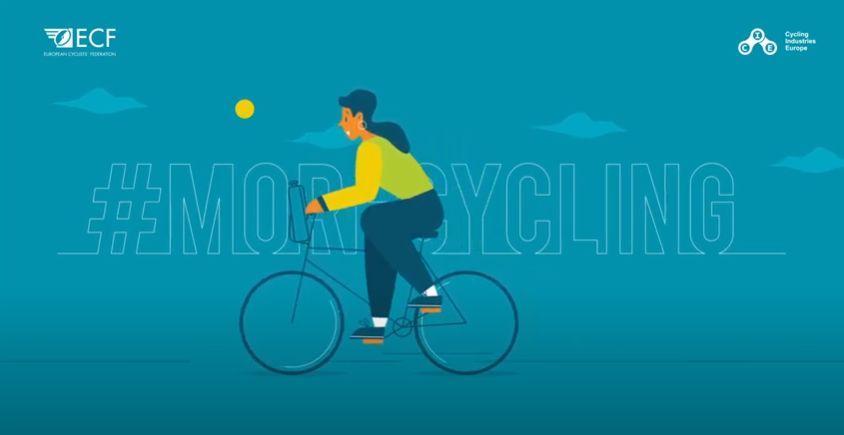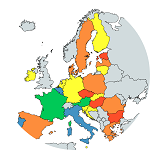
Best of 2020: Advocacy Highlights
#TrainsForCyclists campaign: Dedicated spaces for bicycles assured on all trains in the EU
 Over the past 3 years, ECF intensively advocated to strengthen the existing Rail Passengers’ Rights & Obligations Regulation, which previously did not include any enforceable provision regarding bicycles. This year, ECF launched the #TrainsForCyclists campaign to give one final push in our efforts and are proud to celebrate a resounding success. For the first time in the history of the EU, the reviewed regulation now obliges railway companies to include dedicated space for four bicycles in all new and refurbished trains in Europe.
Over the past 3 years, ECF intensively advocated to strengthen the existing Rail Passengers’ Rights & Obligations Regulation, which previously did not include any enforceable provision regarding bicycles. This year, ECF launched the #TrainsForCyclists campaign to give one final push in our efforts and are proud to celebrate a resounding success. For the first time in the history of the EU, the reviewed regulation now obliges railway companies to include dedicated space for four bicycles in all new and refurbished trains in Europe.
To go further: Press Release welcoming the outcome of the Regulation's recast Press Release calling on Europe to boost multimodality Article on better multimodality for greener mobility Map highlighting bicycle carriage on EU train
More funds for cycling as part of the EU recovery plan
 A recovery plan has been decided by the European Commission (EC) to face the Covid-19 crisis. Member States are now drafting their national recovery plans. The European Commission expects that about € 20 billion will be channeled in support of sustainable urban mobility, including cycling, through these plans.
A recovery plan has been decided by the European Commission (EC) to face the Covid-19 crisis. Member States are now drafting their national recovery plans. The European Commission expects that about € 20 billion will be channeled in support of sustainable urban mobility, including cycling, through these plans.
During a high-level webinar organised late October by ECF and CIE, EC Executive Vice-President Frans Timmermans, and European leaders from across the continent discussed the importance for EU and national authorities to invest in more cycling for a Green Recovery in Europe. To enable this cycling revolution, ECF and CIE released a guidebook to help cities access the Recovery and Resilience Funds.
To go further: Article on Cycling Breakthrough in the EU COVID-19 Recovery Plan Article on Bicycling is the European Way. European Leaders are Ready for the Cycling Revolution Video: Frans Timmermans passion for cycling Video: European cities want #MoreCycling
ECF releases 27 country guides to help cities access EU funds
 As a new 7-year EU Multiannual Financial Framework starts in 2021, the ECF released on 7 December 27 country-specific guides to help local and regional authorities navigate through the EU Structural Funds. The "Unlocking EU Funds For Cycling Investments" report will help them gain access to the European funding available and make Europe a cycling superpower.
As a new 7-year EU Multiannual Financial Framework starts in 2021, the ECF released on 7 December 27 country-specific guides to help local and regional authorities navigate through the EU Structural Funds. The "Unlocking EU Funds For Cycling Investments" report will help them gain access to the European funding available and make Europe a cycling superpower.
Opportunities for cycle investments are plentiful and could reach as much as 6 billion Euro during the next EU budget 2021 – 2027, if past growth trends continue.
To go further: Dedicated landing page on EU funds for cycling
Commitment to ensure cycling is better represented in EU Member States’ final National Energy and Climate Plans (NECPs)
 ECF assessed the 27 draft and final NECPs for 2021 – 2030 against 13 cycling or sustainable mobility-related indicators. Member States have begun to take the decarbonisation potential of cycling more seriously, but there is still a long way to go, as highlighted in the ECF report “Cycling underrepresented in EU Member States’ Final National Energy and Climate Plans”, published on 8 October.
ECF assessed the 27 draft and final NECPs for 2021 – 2030 against 13 cycling or sustainable mobility-related indicators. Member States have begun to take the decarbonisation potential of cycling more seriously, but there is still a long way to go, as highlighted in the ECF report “Cycling underrepresented in EU Member States’ Final National Energy and Climate Plans”, published on 8 October.
ECF calls upon all Member States to fully integrate concrete cycling measures during the NECP implementation phase, and to include these additional cycling measures in the 2022 progress reports.
To go further: Complete article on Cycling Underrepresented in EU Member States’ Final National Energy and Climate Plans
EU Sustainable and Smart Mobility Strategy opens the path to cycling but still a long way to go
 ECF, CIE and CONEBI took part in the public consultation on the roadmap for the European Strategy for Sustainable and Smart Mobility initiative. They called for an equal treatment of cycling compared with other transport modes, for €6bn in EU funding, for improving the EU Urban Mobility policy framework, and for a genuine EU Cycling Strategy. Ahead of the Strategy publication, 17 associations, including ECF, sent a joint letter to EC Executive Vice-president and Transport Commissioner, calling for a commitment to modal shift and to set targets for increasing the share of walking, cycling and public transport. On 9 December, ECF, CIE and CONEBI gave a cautious welcome to the positive statements about cycling in the published Strategy, as a lot more work is still needed.
ECF, CIE and CONEBI took part in the public consultation on the roadmap for the European Strategy for Sustainable and Smart Mobility initiative. They called for an equal treatment of cycling compared with other transport modes, for €6bn in EU funding, for improving the EU Urban Mobility policy framework, and for a genuine EU Cycling Strategy. Ahead of the Strategy publication, 17 associations, including ECF, sent a joint letter to EC Executive Vice-president and Transport Commissioner, calling for a commitment to modal shift and to set targets for increasing the share of walking, cycling and public transport. On 9 December, ECF, CIE and CONEBI gave a cautious welcome to the positive statements about cycling in the published Strategy, as a lot more work is still needed.
To go further: More cycling will be essential to the success of the EU Sustainable and Smart Mobility Strategy | ECF Make walking, cycling and public transport the primary modes in Functional Urban Areas by 2030, stakeholders tell Commission | ECF ECF, CIE, and CONEBI Press Release to react to EC Sustainable and Smart Mobility Strategy Joint letter by the collation of 17 associations to the European Commission
Climate strategy from the European Investment Bank (EIB) includes explicit support for cycling
 In January, EIB released the results of their climate survey, listing cycling and walking as viable options to contribute to reducing greenhouse gas emissions. 69% of the interviewees think that their own individual actions can have an impact in tackling the environmental issues.
In January, EIB released the results of their climate survey, listing cycling and walking as viable options to contribute to reducing greenhouse gas emissions. 69% of the interviewees think that their own individual actions can have an impact in tackling the environmental issues.
On 12 November, after an important stakeholder engagement in which ECF participated, EIB Board of Directors approved the institution’s new Climate Bank Roadmap. As a result, investments in walking and cycling infrastructure are now explicitly mentioned as supported activities in the field of transport. Modal shift is also mentioned as part of the decarbonisation pathway for the road sector.
By the end of this decade, the EIB Group aims to support at least €1 trillion in climate action and environmental sustainability investments.
To go further: Most Europeans think climate change is real, it is caused by humans and humans can reverse it | ECF European Investment Bank launches new climate strategy, including explicit support for cycling | ECF
Contact the author
Recent news!
Upcoming events
Contact Us
Avenue des Arts, 7-8
Postal address: Rue de la Charité, 22
1210 Brussels, Belgium









